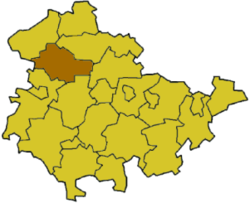Unstrut-Hainich
district in Thuringia, Germany
Unstrut-Hainich is a Landkreis (district) in the north of Thuringia, Germany.
Landkreis Unstrut-Hainich | |
|---|---|
 | |
| Coordinates: 51°10′N 10°30′E / 51.17°N 10.5°E | |
| Country | Germany |
| State | Thuringia |
| Capital | Mühlhausen |
| Area | |
| • Total | 975 km2 (376 sq mi) |
| Population (31 December 2022)[1] | |
| • Total | 97,388 |
| • Density | 100/km2 (260/sq mi) |
| Time zone | UTC+01:00 (CET) |
| • Summer (DST) | UTC+02:00 (CEST) |
| Vehicle registration | UH |
| Website | landkreis-unstrut-hainich.de |
History
changeThe district was set up on July 1, 1994 by joining the two previous districts of Mühlhausen and Bad Langensalza.
Partnerships
changeThe district has a partnership with the Wetteraukreis in Hesse dating back to the German reunification of 1990. The district also has a partnership with the Lithuanian districts of Ukmerge and Raseiniai.
Geography
changeThe district is named after the river Unstrut and a hill chain, the Hainich. The Hainich became the 13th national park of Germany in 1997.
Coat of arms
change| The coat of arms combines the symbols of the historical territories which make up the area of the district. In the topleft is the eagle of the city Mühlhausen, in the topright the lion as the symbol of the dukes of Thuringia. In the bottom left is the wheel of Mainz, and the deer antler in the bottom right is the symbol of the Principality of Schwarzburg-Sondershausen. |
Towns and municipalities
change| Verwaltungsgemeinschaft-free towns | and municipalities |
|---|---|
| Verwaltungsgemeinschaften | ||
|---|---|---|
| ||
| 1seat of the Verwaltungsgemeinschaft; 2town | ||
References
changeOther websites
change- Official website (German)
